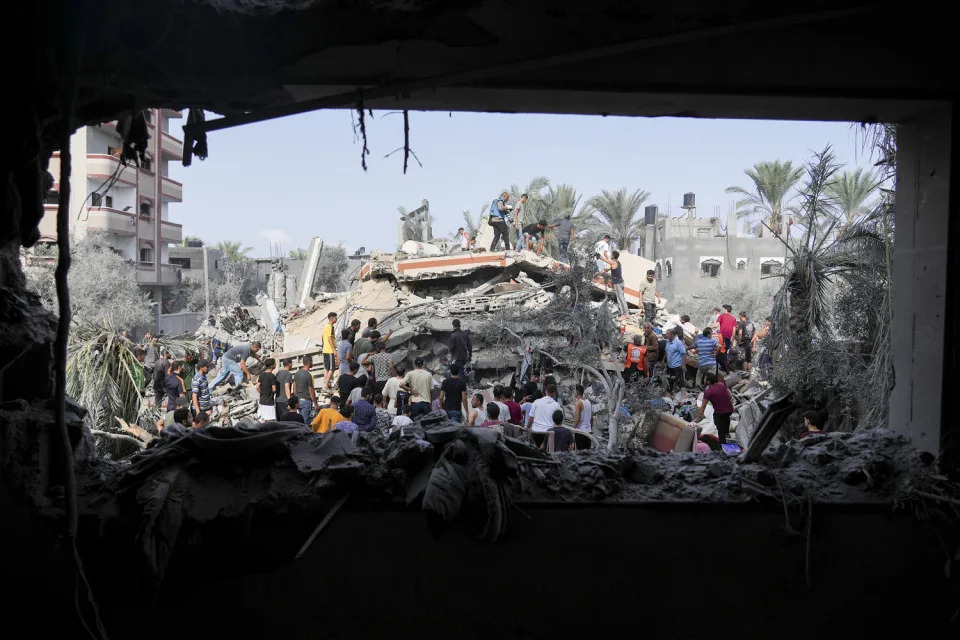Top Stories
Why Netanyahu may be delaying an Israeli ground offensive in Gaza
The silence of is deafening as the world waits for a potential Israeli ground offensive in Gaza.
Eighteen days have passed since more than 2,000 Hamas militants terrorized Israelis, murdering families, killing concertgoers, taking hostages and killing 1,400 people in the bloodiest terrorist attack in the nation’s history. Within hours, Israel declared war on Hamas and began pummeling Gaza with airstrikes that have killed more than 5,000 Palestinians, according to Palestinian health officials.
Prime Minister Netanyahu formed a unity war Cabinet, called up 360,000 Israel Defense Forces reservists and lined up thousands of tanks and armored vehicles along the Gaza border. Then a “hurry up and wait” mentality spread around the world, with each day bringing another delay of the ground offensive that Netanyahu knows will cost many Israeli lives.
Complicating matters, according to a senior government official, is that Netanyahu has not settled on an exit plan for how and when Israeli ground forces will leave Gaza. Meetings have so far focused primarily on day-to-day military operations.
Israel’s next move could further define the legacies of Netanyahu and other leaders.
“Almost everyone making decisions on this knows they bear some responsibility for the disaster of Oct. 7th, whether that’s the political leadership or the military and security leadership,” said Robert Satloff, the Howard P. Berkowitz chair in U.S. Middle East policy at the Washington Institute for Near East Studies. “They all know that how Israel performs in this next phase is their last chance to write what may be their final chapter in public life.”
Israeli national security officials have acknowledged that there will be inquiries and an accounting for Oct. 7 in the future. Leaders across Israel will come under intense scrutiny for the intelligence and policy failures that allowed for the unprecedented terrorist attack.
Officials are also under pressure to save as many of the 220 Israeli and foreign hostages held in Hamas’ underground labyrinth of tunnels in Gaza.
“That’s a huge added dose of anxiety and tension into what is already a tense and anxious, and what is a politically fraught, moment,” Satloff said. “Add it all up and they haven’t made a decision to go in yet.”
American officials have supported Israel’s desire to destroy Hamas while also putting pressure on Israeli leaders to proceed with caution, minimize civilian casualties and try to free hostages.
“If Washington thinks they have an ability to squeeze more hostages out in advance of a ground invasion by working with Egypt and Qatar, they will seek to do that,” said Jonathan Lord, a senior fellow and the director of the Middle East Security program at the Center for New American Security in Washington.
“Hamas would seek to let hostages out in dribs and drabs to forever delay a ground invasion,” he said. “But on the flip side, if the U.S. can use the leverage of a pending ground invasion to twist Hamas’ arm to let more people out, they’re going to try.”
U.S. and international pressure has also helped secure the arrival of aid trucks to Gaza. “Originally, part of President Biden’s visit to the region was to set up a pathway to get aid to the public in Gaza,” Lord added. “Trucks have been coming in. It’s obviously insufficient to need but it’s not nothing.”
Netanyahu must be cautious, too, because of the danger a ground invasion poses to Israel’s own troops, which could die in large numbers. “There is the risk of stepping into a very dangerous trap,” warned a former Israeli senior security official, explaining the caution.
Israeli officials also need to be cautious about committing large numbers of ground troops to Gaza when tensions with Hezbollah — another Iran-backed proxy — have escalated. Hezbollah could attack Israeli forces from Lebanon and open a northern front. “Nobody has an appetite for two fronts at this point,” the official said.
Iran-backed militias are also active in Syria, Iraq and Yemen. On Tuesday, U.S. military officials announced that two dozen American military personnel were wounded last week in a series of drone attacks at U.S. bases in Iraq and Syria. The attacks are believed to have been carried out by Iran-backed forces.
Privately, U.S. officials have pressed Israel to think about what comes in Gaza after Hamas. Some in Israel hope to see a multilateral administration in Gaza with reconstruction funds from Arab states. Others hope that the Palestinian Authority could govern Gaza.
But the truth is that no one knows what entities would have legitimacy in the eyes of Gazans if Hamas is destroyed. And what role, if any, regional actors would be comfortable playing. Netanyahu’s government has not yet publicly articulated a long-term plan.
“Their success is just as much going to be determined by their planning for the end game as the operational planning for the start,” Lord said.
This article was originally published on NBCNews.com


 Politics21 hours ago
Politics21 hours agoKing Salman Humanitarian Aid & Relief Centre and Abibakr As-Sidiq Philanthropic Home Commission Solar-Powered Borehole Project in Kwara State, Nigeria

 News20 hours ago
News20 hours agoBlack Market Dollar (USD) To Naira (NGN) Exchange Rate Today 1st May 2024

 Sports22 hours ago
Sports22 hours agoUCL: Vinicius Jr hails Real Madrid star after scoring 2 against Bayern

 News22 hours ago
News22 hours agoWe And The Trials Of Brother Bello – Prefessor Anthony Kila

 News22 hours ago
News22 hours agoBREAKING: Binance Founder, Zhao sentenced to 4 months in prison

 Sports22 hours ago
Sports22 hours agoUCL: I’m sure – Thomas Tuchel predicts team to play final in Wembley

 Sports20 hours ago
Sports20 hours agoBrentford buy Flying Eagles Defender Frederick from Moses Simon’s Kaduna academy

 Top Stories22 hours ago
Top Stories22 hours agoDangote Refinery To Get Valid Operating Licence Soon – FG







